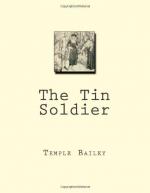“She would look at it like that.”
“When Hilda talks to me”—he was rumpling his hair—“I have a feeling that all the people in the world are unlovely—”
“There are plenty of unlovely people,” said Emily, “but why should we worry with what they think?”
She was knitting, and he found himself watching her hands. “You have pretty hands,” he told her, unexpectedly.
She held them out in front of her. “When I was a little girl my mother told me that I had three points of beauty—my hands, my feet, and the family nose,” she smiled whimsically, “and she assured me that I would therefore never be common-place. ‘Any woman may be beautiful,’ was her theory, ’but only a woman with good blood in her veins can have hands and feet and a nose like yours—.’ I was dreadfully handicapped in the beginning of my life by my mother’s point of view. I am afraid that even now if the dear lady looks down from Heaven and sees me working in my Toy Shop she will feel the family disgraced by this one member who is in trade. It was only in the later years that I found myself, that I realized how I might reach out towards things which were broader and bigger than the old ideals of aristocratic birth and inherited possessions.”
He thought of Hilda. “Yet it gave you something, Emily,” he said, slowly, “that not every woman has: good-breeding, and the ability to look above the sordid. You are like Jean—all your world is rose-colored.”
She was thoughtful. “Not quite like Jean. I heard a dear old bishop ask the other day why we should see only the ash cans and garbage cans in our back yards when there was blue sky above? I know there are ash cans and garbage cans, but I make myself look at the sky. Jean doesn’t know that the cans are there.”
“The realists will tell you that you should keep your eyes on the cans.”
“I don’t believe it,” said Miss Emily, stoutly; “more people are made good by the contemplation of the fine and beautiful than by the knowledge of evil. Eve knew that punishment would follow the eating of the apple. But she ate it. If I had a son I should tell him of the strength of men, not of their weaknesses.”
He nodded. “I see. And yet there is this about Hilda. She does not deceive herself;—perhaps you do—and Jean.”
“Perhaps it is Hilda who is deceived. All the people in the world are not unlovely—all of them are not mercenary and deceitful and selfish.” Her cheeks were flushed.
“Nobody knows that better than a doctor, Emily. I am conscious that Hilda draws out the worst in me—yet there is something about her that makes me want to find things out, to explore life with her—”
He was smiling into the fire. Miss Emily girded herself and gave him a shock. “The trouble with you is that you want the admiration of every woman who comes your way. Most of your patients worship you—Jean puts you on a pedestal—even I tell you that you have a soul. But Hilda withholds the admiration you demand, and you want to conquer her—to see her succumb with the rest of us.”




